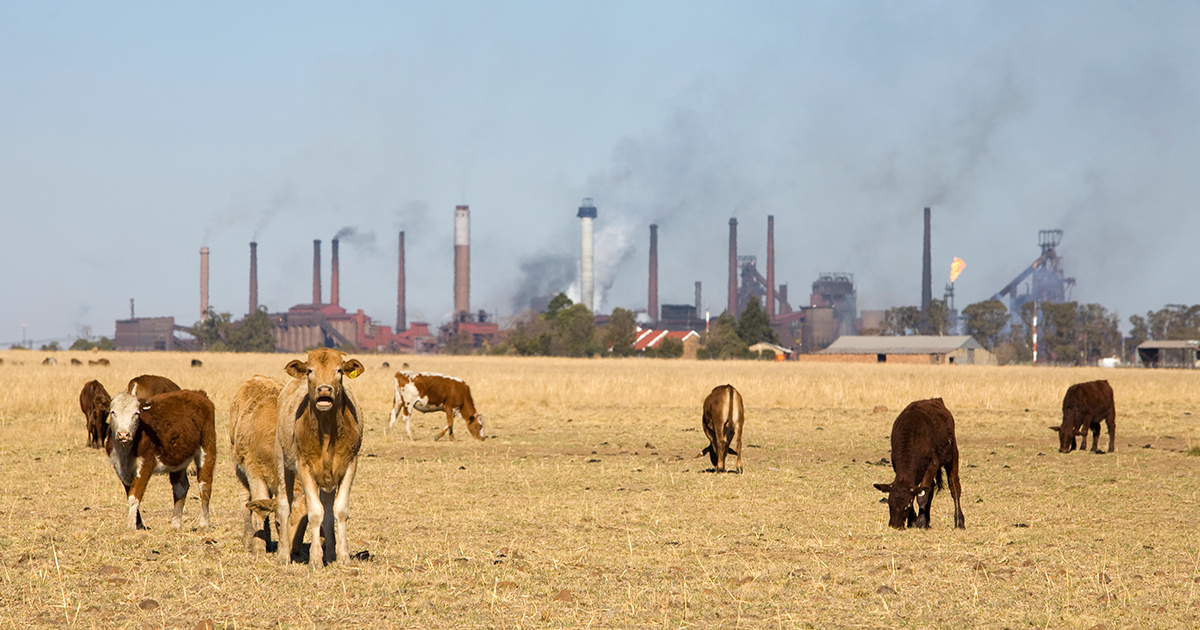
The Climate Crisis Is ‘a Perfect Storm’ Headed for the World’s Food Supply

Farm land bordering an industrial area in South Africa. John Hogg / World Bank Photo Collection
Food production must change drastically and immediately in order to sustain ourselves through the ongoing climate crisis, says a new United Nations report put together by more than 100 experts from 52 different countries, according to The New York Times.
The special report by the Intergovernmental Panel on Climate Change concluded that efforts to curb greenhouse gas emissions and to contain global warming will not be enough to feed the world’s growing population, if we do not see seismic shifts in global land use, agriculture and human diets, as Nature reported.
The report found a sliver of hope, if governments and corporations around the world act now to allow soils and forests to regenerate and store carbon, and to cut meat consumption and food waste in industrialized nations, The Guardian reported. The report noted that nearly one-fourth of all food is wasted.
As the climate crisis accelerates and global heating increases, droughts, soil erosion, floods, wildfires and various types of extreme weather diminish crop yields and the global food supply. Increased greenhouse gases in the atmosphere from thawing permafrost and wildfires will lead to extraordinary climate conditions at lower latitudes, which may cause a spike in hunger despite the fact that 10 percent of the world already suffers from chronic hunger, as Ecowatch reported.
A rise in food shortages may lead to cross-border migrations, violent conflicts and damage to the northern forests when their resources are plundered, according to The Guardian.
“This is a perfect storm,” said Dave Reay, a professor at the University of Edinburgh who was an expert reviewer for the IPCC report, to The Guardian. “Limited land, an expanding human population, and all wrapped in a suffocating blanket of climate emergency. Earth has never felt smaller, its natural ecosystems never under such direct threat.”
The IPCC sees an acute threat if food crises could happen on several continents at once, said Cynthia Rosenzweig, a senior research scientist at the NASA Goddard Institute for Space Studies and one of the lead authors of the report, as The New York Times reported. “The potential risk of multi-breadbasket failure is increasing,” she said. “All of these things are happening at the same time.”
Some experts predict that the food shortages will affect poorer parts of the world, increasing a flow of immigrants into North America and Europe, which is already redefining politics worldwide and leading to the popularity of hard-liner, nationalist politicians, according to The New York Times.
The IPCC did offer a pathway out of the impending food crisis, which requires aforementioned changes in land use and in consumer behavior.
“One of the important findings of our work is that there are a lot of actions that we can take now. They’re available to us,” said Dr. Rosenzweig to The New York Times. “But what some of these solutions do require is attention, financial support, enabling environments.”
As far as action that a consumer can take immediately, scientists and economists who study diets and the environment have been advocating a move to a plant-centered diet, as NPR reported.
Right now, nearly 50 percent of the world’s land is dedicated to agriculture, a third of which is solely dedicated to growing grain for animal feed. Since livestock require so much food, meat production is a leading cause of deforestation, which takes away trees that will filter out greenhouse gas emissions.
A report released last month by the World Resources Institute, on which Ecowatch reported, finds that if current patterns continue, additional agricultural land measuring about twice the size of India is required to feed nearly 10 billion people by 2050.
“You’re sort of reaching a breaking point with land itself and its ability to grow food and sustain us,” said Aditi Sen, a senior policy adviser on climate change at Oxfam America, as The New York Times reported.

 233k
233k  41k
41k  Subscribe
Subscribe 